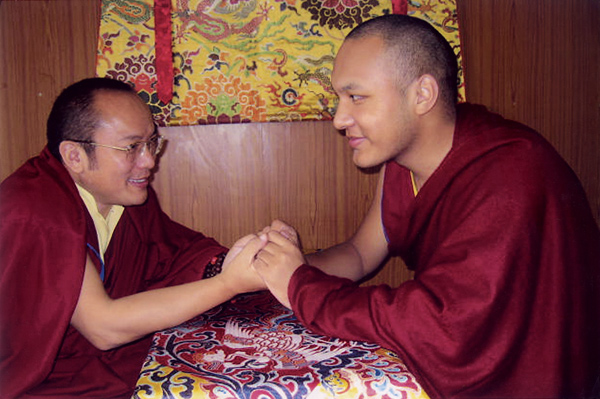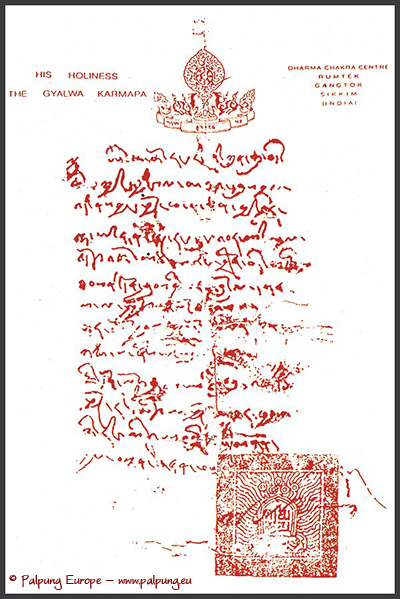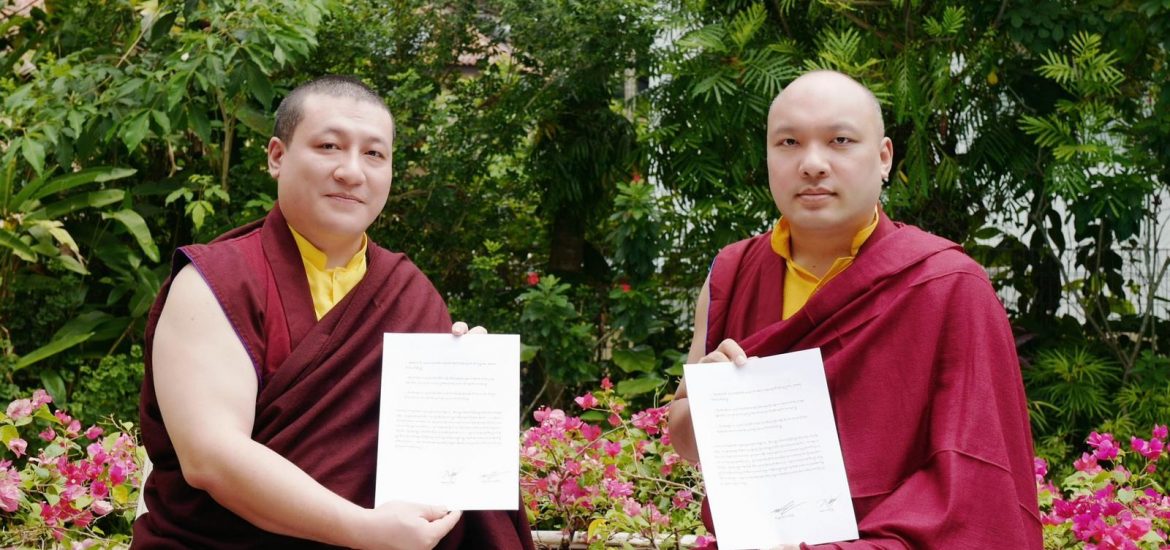By Adele Tomlin
“Real friendship is based on two things: respect and trust.”
On 4 December 2023, the 17th Karmapa, Ogyen Trinley Dorje, together with the unofficial contender for this ancient title, Thaye Dorje, released a joint written statement (in Tibetan and English) regarding the future recognition of the Shamarpa Rinpoche incarnation:
“For the recognition to be unmistaken and undisputed would have tremendous benefit for reuniting the Karma Kagyu. Thus, the two of us are shouldering this responsibility that has fallen on us both. Despite many difficulties, we have met several times and had deep conversations that have greatly increased our sincere intentions. To summarise the results of our discussions:
- The recognition of Shamar Rinpoche’s reincarnation will be a joint effort by the two of us together. Neither of us will do it separately.
- In order for Shamar Rinpoche’s Yangsi to be able to live up to his name, the two of us will take joint responsibility for his education, empowerments, transmissions, and pith instructions.
- As the topic of Shamar Rinpoche’s reincarnation is a crucial point of concern within the Kamtsang, we will not accept interference from any uninvolved parties.”
The full statement can be read in full here.
As someone who is a devoted follower and writer about the 17th Karmapa (and the Karmapas in general) for many years, I, like others, had mixed feelings reading this statement and seeing the two men pictured together again in an attempt at public unity. On the one hand, it is good that they both seem to want to end the horrendous conflict and divide that has damaged and dogged the Karma Kagyu for over the last thirty years. In particular, to try and ensure there is no further conflict from the recognition of the future Shamar incarnation.
On the other hand, what seems to be very much lacking in their joint statement is any sign of accountability, truth-telling and apology from Thaye Dorje and the people who supported him, since they bear responsibility for the major schism in the Karma Kagyu in the first place. Forgiveness, peace and resolution is extremely difficult to achieve when no real accountability for serious wrongs committed has been shown.
For example, as Mick Brown the British investigative journalist wrote in the only genuinely objective account of the whole ‘Karmapa’ recognition issue, The Dance of 17 Lives: The Incredible True Story of Tibet’s 17th Karmapa (Brown interviews all the parties involved), the actions and words of the 14th Shamarpa and his followers were appallingly bad, not only towards the official 17th Karmapa, Ogyen Trinley Dorje but also toward the 12th Tai Situpa, 12th Gyeltsab Rinpoche and 3rd Jamgon Kongtrul, the main heart sons.
In addition, the 14th Dalai Lama, who as the former spiritual head of Tibet normally gives the official seal to all Tibetan incarnate teachers, never accepted Thaye Dorje as a valid candidate and stated in the film the Lion Begins to Roar, that he never heard or saw any evidence to support the contention that he was the 17th Karmapa. This led to a flurry of accusations by the Thaye Dorje supporters that the 17th Karmapa, Ogyen Trinley Dorje, who had also been officially recognised by the Karma Kagyu in Tibet at the main seat of the Karmapas, Tsurphu Monastery, was now the Dalai Lama and Gelugpa choice. A bizarre accusation indeed considering that both the 16th Karmapa and 14th Shamarpa were both given the official seal of approval by the 14th Dalai Lama as well!

I interviewed Mick Brown recently and we discussed his book and the situation that arose, including that of the 14th Shamarpa bringing armed soldiers into Rumtek Monastery, allegedly at the arrangement of the Bhutanese royal family (whom he was very well-connected to), in order to take back full control of the monastery with his private secretary, Tobga (who was married to a Bhutanese princess). This unprecedented, aggressive action by the 14th Shamarpa led to a two-day strike by the Sikkimese state government, which was infuriated that the Indian central government had neither sought their permission for nor given forewarning of the Indian military being deployed in Sikkim in that manner.
This was followed by 14th Shamarpa and his followers openly accusing Tai Situpa of being a liar, and fraudulently creating the only precious document relating to the 17th Karmapa recognition, a handwritten letter of the 16th Karmapa, which he left to the 12th Tai Situpa before he passed away. Tai Situpa was also accused of being Chinese spy, and this careless accusation led to him unable to travel freely to India and meet and teach the 17th Karmapa there.
Neither Thaye Dorje nor his followers have ever apologised for, or backtracked on, these accusations. In fact, the court case they began for control of Rumtek Monastery seems to be still ongoing and has played a significant role in preventing the 17th Karmapa from visiting and teaching there for many years.
It is big-hearted (and understandable) of the 17th Karmapa, Ogyen Trinley Dorje to meet with Thaye Dorje, when he already has the support of the vast majority of Karma Kagyu Tibetan and Himalayan monks, nuns and laypeople in Tibet and exile. Thaye Dorje’s actual Karma Kagyu followers, other than a minority of Tibetans who followed Shamarpa, are mainly a small (yet very pro-active and vocal) group of white Europeans from Diamond Way Buddhist centres.
Although the 17th Karmapa has also stated publicly before that the 14th Dalai Lama suggested the two meet and try to repair the division, so there has been outside pressure on him too. Whatever the reason, if Thaye Dorje and his followers are to be trusted and are genuinely concerned about peace, harmony and good will and having a lasting “ceasefire” in Karma Kagyu, then apologising for, and putting a halt to any ongoing court cases and such false accusations seem the most obvious, and minimum things to be done.

In January next year, at the forthcoming Kagyu Monlam in Bodh Gaya, India the 12th Tai Situpa will be leading it for the first time. Forbidden from going to the Monlam for years due to the false accusations about him, it is good to see that he will finally be allowed. Will Thaye Dorje and his remaining followers attend that Monlam and pay respects to Tai Situ and withdraw their slanderous accusations about the 16th Karmapa’s letter? Will there be any accountability and truth for actions and words that have been spoken by them about the 17th Karmapa and the main Karma Kagyu teachers, and about the 14th Dalai Lama too? Let us hope so.
It is only then that myself, and many other followers of the 17th Karmapa, Ogyen Trinley Dorje, will trust that Thaye Dorje and their followers are sincere about peace, harmony, goodwill and respect. Saying one thing publicly, but slandering the 17th Karmapa and the Kagyu heart son teachers privately, will never lead to a genuine, long-lasting peace or friendship.
Finally, on a more general note, forgiveness and peace should not only be for powerful, well-known male teachers and lamas. The hand of friendship, genuine reconciliation, and amends should be offered to female survivors of lama misconduct who have been shunned, ignored, defamed, and isolated. Influential men can usually get whatever they want, including forgiveness. Yet the historical Buddha took honesty, discipline and ethics seriously and members of the sangha were expelled if they breached Vinaya rules. There were also regular and transparent meetings held in which wrongdoings were openly and fairly discussed and resolved within the community itself.
Taking into consideration the Buddha’s own views on accountability, true peace means genuine acknowledgement and accountability taken for clear lies and wrongdoings. Brushing it all under the carpet and hoping it all goes away has never worked practically, emotionally, and certainly not karmically. After serious conflict and harm, professionals who work in peace and reconciliation know that there can be no real peace or trust without justice, accountability and truth.
Unity is good but not if it rides roughshod over truth and ethics.
This views of the author in this article do not necessarily reflect the view of BDG


